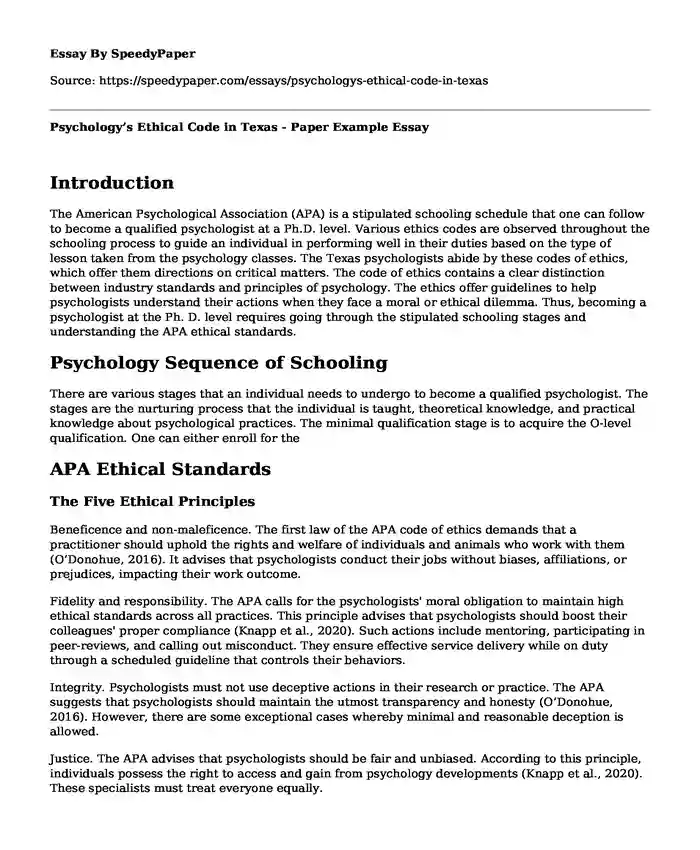
| Type of paper: | Essay |
| Categories: | Psychology United States |
| Pages: | 3 |
| Wordcount: | 668 words |
Introduction
The American Psychological Association (APA) is a stipulated schooling schedule that one can follow to become a qualified psychologist at a Ph.D. level. Various ethics codes are observed throughout the schooling process to guide an individual in performing well in their duties based on the type of lesson taken from the psychology classes. The Texas psychologists abide by these codes of ethics, which offer them directions on critical matters. The code of ethics contains a clear distinction between industry standards and principles of psychology. The ethics offer guidelines to help psychologists understand their actions when they face a moral or ethical dilemma. Thus, becoming a psychologist at the Ph. D. level requires going through the stipulated schooling stages and understanding the APA ethical standards.
Psychology Sequence of Schooling
There are various stages that an individual needs to undergo to become a qualified psychologist. The stages are the nurturing process that the individual is taught, theoretical knowledge, and practical knowledge about psychological practices. The minimal qualification stage is to acquire the O-level qualification. One can either enroll for the
APA Ethical Standards
The Five Ethical Principles
Beneficence and non-maleficence. The first law of the APA code of ethics demands that a practitioner should uphold the rights and welfare of individuals and animals who work with them (O’Donohue, 2016). It advises that psychologists conduct their jobs without biases, affiliations, or prejudices, impacting their work outcome.
Fidelity and responsibility. The APA calls for the psychologists' moral obligation to maintain high ethical standards across all practices. This principle advises that psychologists should boost their colleagues' proper compliance (Knapp et al., 2020). Such actions include mentoring, participating in peer-reviews, and calling out misconduct. They ensure effective service delivery while on duty through a scheduled guideline that controls their behaviors.
Integrity. Psychologists must not use deceptive actions in their research or practice. The APA suggests that psychologists should maintain the utmost transparency and honesty (O’Donohue, 2016). However, there are some exceptional cases whereby minimal and reasonable deception is allowed.
Justice. The APA advises that psychologists should be fair and unbiased. According to this principle, individuals possess the right to access and gain from psychology developments (Knapp et al., 2020). These specialists must treat everyone equally.
Respect for People’s Rights and Dignity. Psychologists must have the utmost respect for the dignity and privacy of those that they encounter in their line of work. This principle also calls for impartiality on race, age, gender, religion, disability, among other diversity factors.
Conclusion
In conclusion, the APA code of ethics stipulates the moral and ethical compass for practicing psychologists. The ethics offer unique guidelines that one can follow to become a professional who is well baked to handle the psychological matter by offering the needed solution in the industry. It outlines the industry standards that provide directions on competence, resolutions for ethical matters, and clients' privacy. Moreover, it has laws that govern integrity, non-maleficence, justice, fidelity, and respect for people's rights. The ethics offer guidelines to help psychologists understand their actions when they face a moral or ethical dilemma. Thus, becoming a psychologist at the Ph. D. level requires going through the stipulated schooling stages and understanding the APA ethical standards. They provide the best-needed schooling schedule that an individual can follow in becoming some most qualified personnel in the psychology profession.
References
Knapp, S., Gottlieb, M. C., & Handelsman, M. M. (2020). The Ethics Code Does Not Equal Ethics: A Response to O’Donohue. Ethics & Behavior, 30(4), 303-309. https://www.tandfonline.com/doi/pdf/10.1080/10508422.2020.1714444?casa_token= 7E7Aff3eEAAAAAA:cbpX6rpG9uqgRqQWkogEfyE0U15bxXqGOmS5pD8Il3DqeD RQSRlNj9YtB3qmly-PJ_dcV2PtuHM6BEZqw
License, P. (2016). Becoming a Psychologist in Texas. Retrieved from Psychologist License: https://www.psychologist-license.com/psychologist-requirements/texas-psychologist.html
O’Donohue, W. T. (2016). Oppression, privilege, bias, prejudice, and stereotyping: Problems in The APA code of ethics. Ethics & Behavior, 26(7), 527-544. PvziiRm8d46k79pCpE_mgzSE8_TKuRo9A" https://www.tandfonline.com/doi/pdf/10.1080/10508422.2015.1069191?casa_token=B
Cite this page
Psychology's Ethical Code in Texas - Paper Example. (2023, Dec 23). Retrieved from https://speedypaper.net/essays/psychologys-ethical-code-in-texas
Request Removal
If you are the original author of this essay and no longer wish to have it published on the SpeedyPaper website, please click below to request its removal:
- Police Brutality Essay Sample
- Essay Example Dedicated to the Obstruction of Justice by Donald Trump
- Essay Sample on the Theme of Family Relationship in the Story "Sonny's Blues"
- Essay Sample on Diabetes and Its Relationship to the Health of the American Public.
- Psychology's Ethical Code in Texas - Paper Example
- Samantha Power's Actions towards the Fight of Ebola in West Africa - Essay Sample
- Essay Sample: Foundational Pros and Cons of Healthcare Reform in The United States
Popular categories




